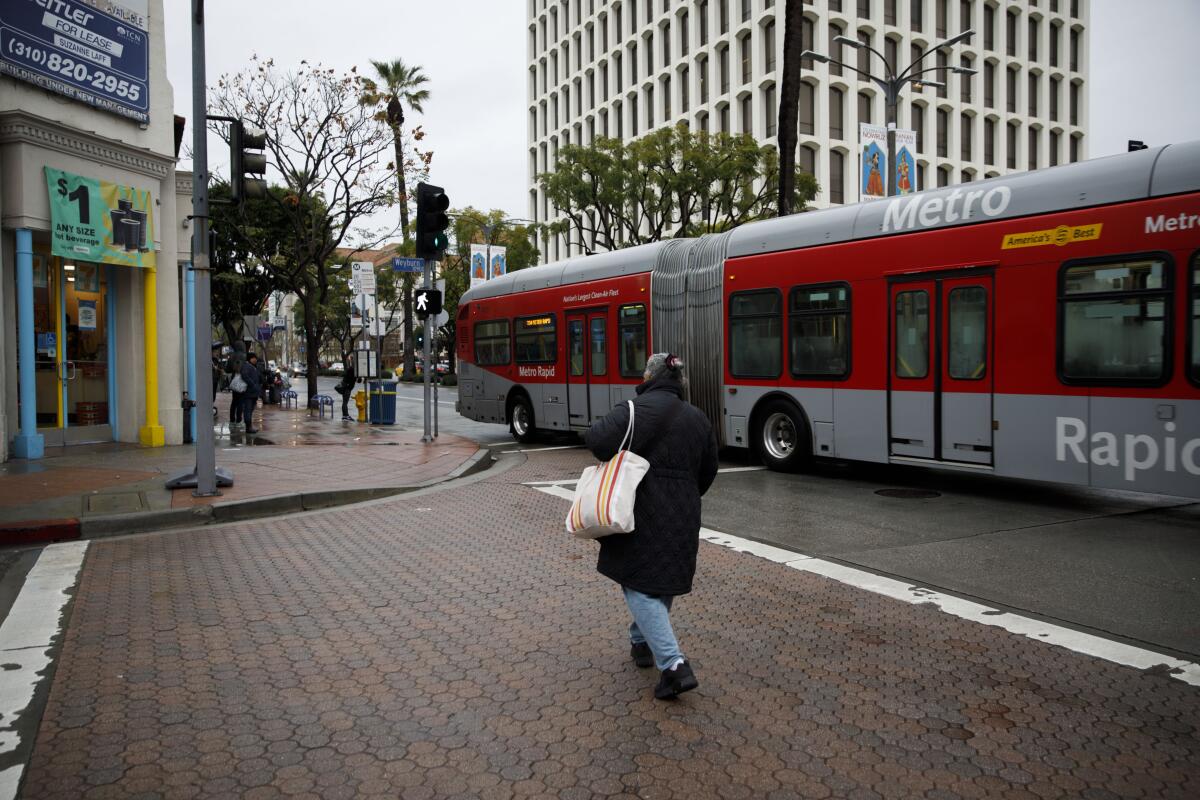Editorial: Biden freezes billions in funding to punish California for an old pension reform law

To great fanfare this week, President Biden signed the $1.2-trillion infrastructure bill into law that includes, as he said, an “unprecedented” and “historic” investment in public transit.
But apparently not for California. Even as the president was taking a victory lap for getting the infrastructure spending package passed, his administration was preparing to block $12 billion in public transit funding for California. Why? The Department of Labor decided to withhold federal grant money on the faulty premise that the state’s 2013 pension reform law undermines workers’ collective bargaining rights.
The decision would put a freeze on emergency relief that Congress approved earlier this year to help transit agencies stay afloat after they lost ridership and revenue during the COVID-19 pandemic. Transit operators have relied on that money to keep buses and trains running, and they may have to cut service if that funding is stopped. The $9.5 billion that California is supposed to get for transit projects from the new infrastructure bill is also in question.
Depending on how long the standoff between the federal government and California lasts, transit agencies may have to delay development or borrow money to keep major projects, like the BART expansion in the Bay Area, on track. In Los Angeles County, the Metropolitan Transportation Authority has relied on federal grants to restore bus service after the pandemic slowdown. The agency has also planned to use federal money to buy zero-emission buses and to develop light-rail lines in the east San Fernando Valley and Southeast L.A.
The Biden administration’s action is particularly disappointing because it runs counter to many of the president’s climate priorities. Halting these funds would hurt transit riders, who are disproportionately lower income and rely on bus and rail service to get to work and school, and potentially slow transit expansion projects that are key to helping communities reduce their reliance on polluting cars.
It’s also mind-boggling that the Biden administration would cut off California now; the law in dispute is nearly a decade old and has been upheld by previous court decisions.
This fight stems from a pension reform effort pushed by Gov. Jerry Brown to reduce the ballooning bills for public employees’ retirement benefits, which were expected to cost many billions of dollars more than what state and local governments had set aside for them. The Legislature agreed to a modest overhaul that took effect in 2013. The changes included raising the retirement age for new hires and requiring them to contribute more toward their benefits, and curtailing some rules that allowed employees to inflate their pension benefits.
Public-sector unions filed numerous lawsuits to block the law, many of which have been rejected. The Obama administration got involved too, threatening to withhold federal transit funding on the grounds that the change violated a 1964 federal law designed to protect transit employees’ collective bargaining rights. Brown fought the Labor Department’s decision and won in federal court.
In an angry letter to Labor Secretary Marty Walsh, Gov. Gavin Newsom pointed out that federal and state courts have repeatedly rejected the idea that the pension reform law impairs collective bargaining agreements. This should be settled law by now. Instead the Biden administration is rehashing old arguments at the expense of California transit riders. Newsom has asked a federal court to force the Labor Department to release the funds while the issue is litigated in court, again.
What’s the endgame? Public employee unions carry tremendous sway in California. Still, lawmakers agreed to trim pensions because they recognized that the rising cost of retirement benefits could bankrupt some cities and ultimately result in fewer services and jobs. If Biden wants California to roll back pension reforms, is the federal government prepared to bail out transit agencies that have to cover higher retirement costs? And what happens when other public-sector employee unions demand the same treatment?
Biden ought to stop fighting over the past. This should be a moment when California and the federal government are partnering to expand public transit for the benefit of riders and the environment.
More to Read
A cure for the common opinion
Get thought-provoking perspectives with our weekly newsletter.
You may occasionally receive promotional content from the Los Angeles Times.










